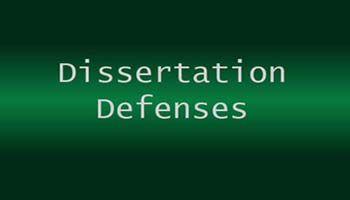
There will be two defenses this week: Elena Sherman will be defending her dissertation, "A Unifying Approach to Behavioral Coverage" on November 19 at 8 a.m. in 103C Avery Hall and Steven Becker will be giving a Masters Project Defense of "Experiments on Video Streaming over Computer Networks" on November 20 at 9 a.m. in 256C Avery Hall.
"A Unifying Approach To Behavioral Coverage"
Developing methods for validating that a program works as intended is one of the key research areas in software engineering. Ideally a program P must exhibit its expected behavior, or property, φ on all of its inputs, i.e., P |= φ. The software engineering community has developed various program analysis approaches to assess whether P |=φ. In general, these approaches can be partitioned into dynamic and static program analysis. The former execute P on a particular input and checks that the execution conforms to φ. The latter interprets the code of P and checks that on all possible executions of P the property φ holds. Unfortunately, in general neither dynamic nor static analysis can independently determine P |= φ.
The idea of combining information computed by different analyses has been circulating in the research community since the mid 1960’s and has shown the benefits of analyses unification. Several approaches have been developed for combining multiple static analyses, and combining static and dynamic analyses. These approaches mainly deal with combining the intermediate result of one analysis to help another analysis with deciding P |= φ. This dissertation takes an alternative approach by allowing each analysis to determine P |= φ under some conditions. Then, combining the final results of such analyses causes P |= φ to hold under a weaker condition until, ultimately, an unconditional final result is produced.
This dissertation formalizes and implements a unification framework that combines computed information from analyses and disseminates that information among other analyses. This framework is extensible since the only requirement that an analysis should satisfy is to have querying and reporting capabilities. Conducted in this context of the unification framework, our experiments have shown that combining results from a diverse set of analyses produces weaker conditions for P |= φ than analyses can achieve operating in isolation.
"Experiments On Video Streaming Over Computer Networks"
Video traffic (including streaming video service) is dominating the Internet traffic today. Video can be streamed using a dedicated server, a content delivery network (CDN), or peer-to-peer (P2P) overlays across a network. Video can be transmitted in multiple formats and at different resolutions. Video is also being distributed to a variety of devices (fixed and mobile).
In this project, we investigate the evolution of streaming video standards over time and the corresponding effects on the Internet that have occurred as a direct result of increasing video traffic. We also examine several options for transmitting video over computer networks. In particular, we focus on streaming video from a server to a client under multiple scenarios including (1) a local network testbed, (2) a home network, (3) across Internet2 between the University of Nebraska and Rutgers University, and (4) between nodes on the global PlanetLab overlay testbed. For these scenarios, we evaluate the user video Quality of Experience (QoE) using both subjective and objective criteria. Our experiments also investigate the performance of different transcoding standards for video such as H.264, Theora, Dirac, MPEG- 2, DIV3, and WMV. Compared to transmission over IP networks, the performance across a switched layer-2 path (Ethernet VLAN) is found to be superior and feasible with today’s technological advances, even across the Internet2 backbone.